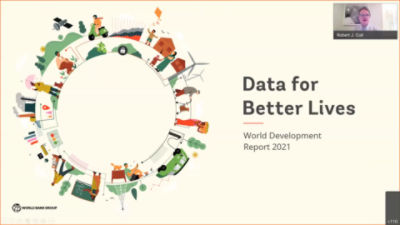focuses on the potential of data to improve the lives of poor people, including through the creative use and re-use of data, and the essential elements of a data governance environment in the form of data infrastructure policy, the legal and regulatory framework, related economic policy implications, and institutional ecosystems. These diverse elements can be conceived of as the building blocks of a social contract that aims to deliver equitably on the potential benefits of data while safeguarding against harmful outcomes.
In this Policy Research Talk, members of the World Development Report team will highlight research being done by World Bank staff that illustrates the potential to combine private and public intent data to yield timelier, more granular insights to confront policy challenges, as well as research findings from data quality experiments and assessments. The team will also present new data sources released in conjunction with the report describing (i) countriesˇŻ capacities to deliver both foundational data (census, administrative records, surveys of households, firms) and to leverage alternative data sources (citizen-generated, machine-generated, geospatial), and (ii) domestic laws, regulations, and administrative frameworks to promote fuller participation in the digital economy.
